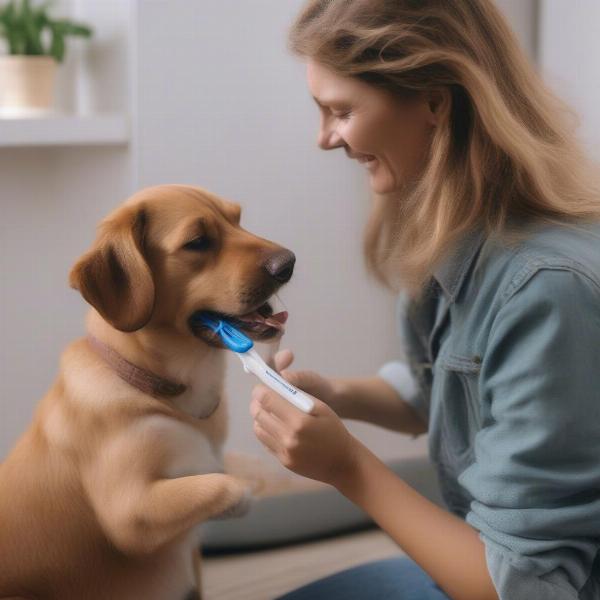Dental sticks are a popular choice for dog owners looking to improve their furry friend’s dental hygiene. But with so many options available, it’s crucial to understand the benefits, risks, and how to choose the best dental sticks for your dog’s specific needs. This guide will cover everything you need to know about dental sticks, from their effectiveness in combating plaque and tartar to potential hazards and recommended alternatives.
Understanding the Benefits of Dental Sticks
Dental sticks can be a valuable addition to your dog’s dental care routine. They are designed to mechanically scrape away plaque and tartar as your dog chews, promoting cleaner teeth and fresher breath. Some dental sticks contain ingredients that help to freshen breath, and others are formulated to support gum health. However, not all dental sticks are created equal.
Choosing the Right Dental Stick for Your Dog
Selecting the right dental stick involves considering your dog’s size, age, chewing habits, and any existing dental conditions. For aggressive chewers, look for durable sticks that won’t splinter or break easily. Puppies and senior dogs may require softer options. Always choose dental sticks that are appropriately sized for your dog to prevent choking hazards. Ingredients matter too! Opt for natural, digestible ingredients and avoid artificial colors, flavors, and preservatives.
Potential Risks and Considerations
While dental sticks offer benefits, they also carry potential risks. Some dogs may swallow large pieces, leading to choking or digestive blockages. Hard dental sticks can potentially fracture teeth, especially in dogs with pre-existing dental issues. Certain ingredients, such as rawhide, can be difficult to digest and pose health risks. It’s vital to supervise your dog while they are enjoying a dental stick and always provide fresh water. If you notice any unusual behavior or digestive problems, consult your veterinarian.
Alternatives to Dental Sticks
Dental sticks aren’t the only way to keep your dog’s teeth clean. Regular brushing remains the gold standard for canine dental hygiene. yak sticks for dogs are a natural and long-lasting chew that can help remove plaque and tartar. Dental toys and chews can also be effective in promoting dental health. A balanced diet and regular veterinary check-ups are essential for overall oral health.
 Brushing a Dog's Teeth
Brushing a Dog's Teeth
Are Dental Sticks Effective for Cleaning Dogs’ Teeth?
Dental sticks can contribute to cleaning a dog’s teeth by scraping away plaque and tartar buildup. However, they are not a replacement for regular brushing.
How Often Should I Give My Dog a Dental Stick?
Giving your dog a dental stick once a day is generally sufficient. Overfeeding can lead to digestive issues and weight gain. Always consult with your vet.
Can Puppies Have Dental Sticks?
Yes, puppies can have dental sticks, but ensure you choose sticks specifically designed for puppies. These are typically softer and smaller to prevent choking hazards.
What Ingredients Should I Avoid in Dental Sticks?
Avoid dental sticks containing artificial colors, flavors, preservatives, and rawhide. Rawhide can be difficult for dogs to digest and may present choking hazards.
What Should I Do if My Dog Swallows a Large Piece of Dental Stick?
If your dog swallows a large piece of dental stick, monitor them closely for signs of distress. If they show any signs of choking or digestive blockage, contact your veterinarian immediately.
Conclusion
Dental sticks can be a helpful tool in maintaining your dog’s oral hygiene, but it’s crucial to choose wisely and use them responsibly. Consider your dog’s individual needs, supervise chewing sessions, and prioritize regular brushing and veterinary checkups for optimal dental health. By following these guidelines, you can help keep your canine companion’s teeth clean and their breath fresh for years to come. Remember to always consult your veterinarian if you have any concerns about your dog’s dental health. are pork ears good for dogs
FAQ
- What are the best dental sticks for small dogs? Choose dental sticks specifically designed for small breeds to prevent choking hazards. Look for softer textures and smaller sizes.
- Are dental sticks good for aggressive chewers? Look for durable, long-lasting dental sticks designed for aggressive chewers that won’t splinter or break easily. bully stick holder for dogs can also be helpful.
- Can dental sticks replace teeth brushing? No, dental sticks should not replace regular brushing. Brushing remains the most effective way to remove plaque and tartar.
- How can I tell if a dental stick is too hard for my dog? If your dog struggles to chew the stick or seems to be experiencing discomfort, it may be too hard.
- What are some signs of dental problems in dogs? Bad breath, excessive drooling, difficulty chewing, red or swollen gums, and loose teeth are all potential signs of dental problems. pigs trotters for dogs can be a good alternative chew.
- How often should I take my dog to the vet for dental checkups? Annual dental checkups are recommended, but your veterinarian may advise more frequent visits based on your dog’s individual needs.
- Are there any homemade dental stick recipes? Yes, there are various homemade dental stick recipes available online, but always consult with your vet before introducing new foods to your dog’s diet. raw bones for dogs are another option to consider.
About ILM Dog
ILM Dog is your trusted international resource for all things dog-related. We offer expert advice on dog breeds, health, training, nutrition, grooming, and much more. Our website provides practical and reliable information for both new and experienced dog owners, helping you navigate every aspect of dog care. For personalized advice or to learn more about our services, contact us at [email protected] or +44 20-3965-8624. Visit ILM Dog for all your canine needs.